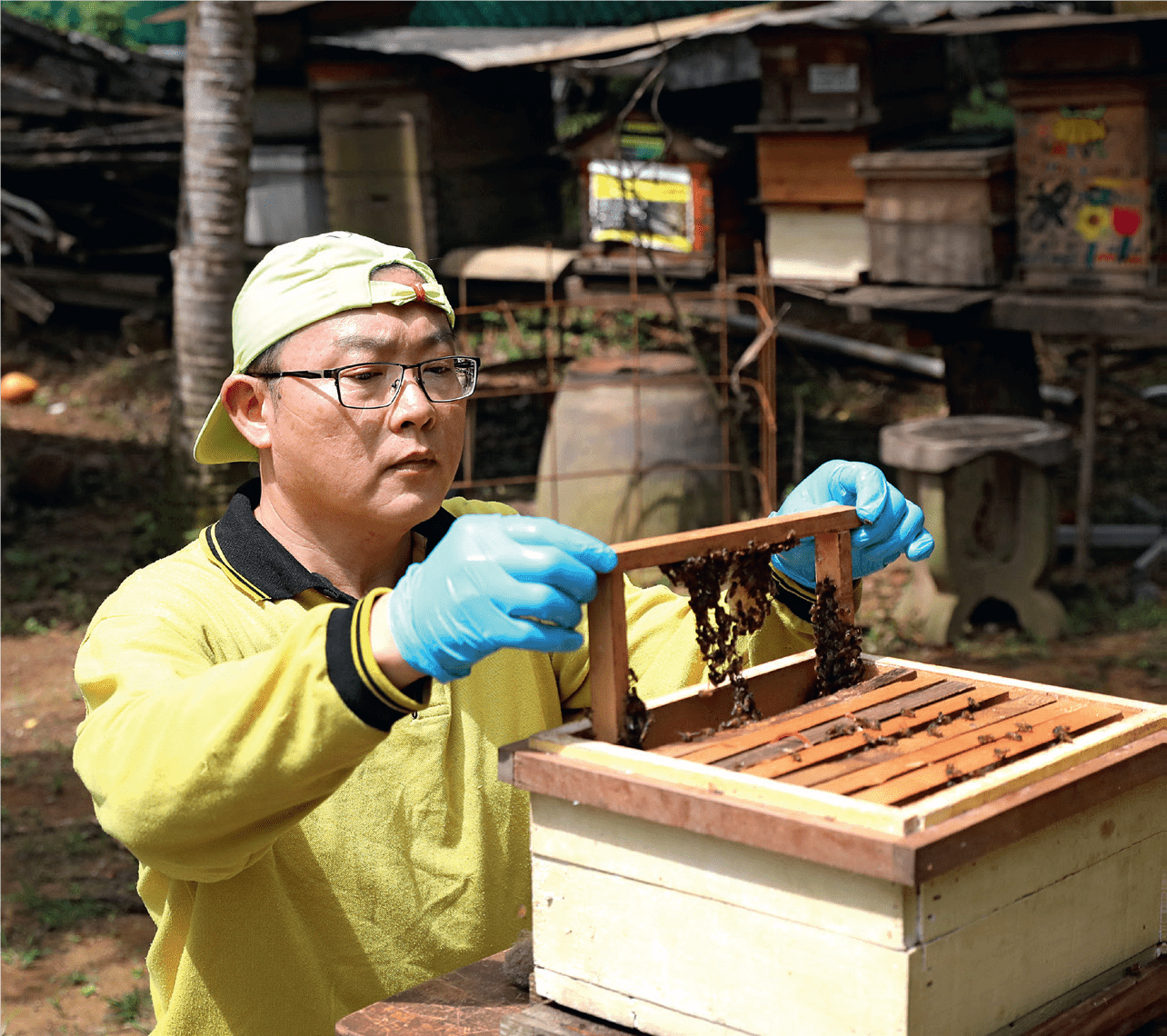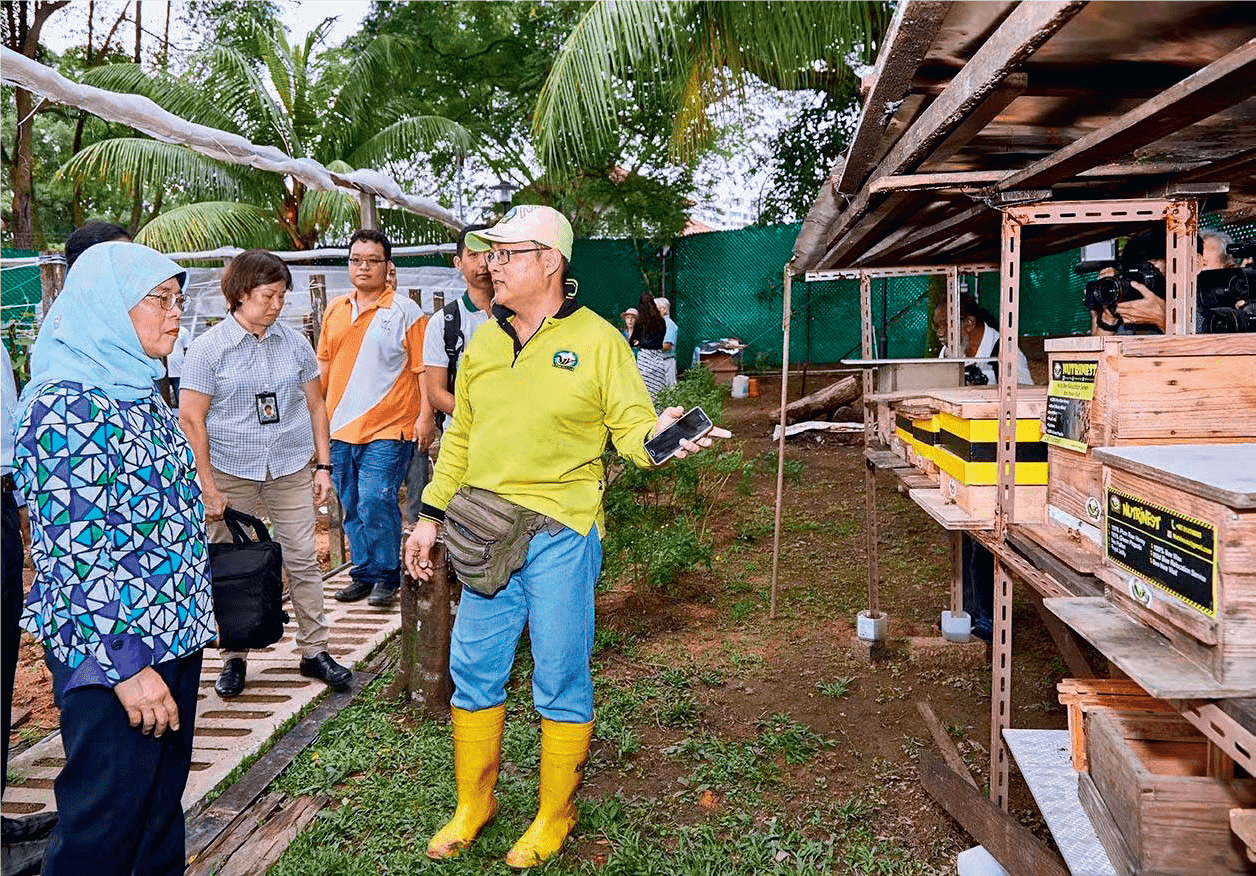Stories > Making A Beeline For Conservation
Making A Beeline For Conservation
Singaporean beekeeper Xavier Tan wants the world to know just how important the local honeybee is to the ecosystem.
BY ZHOU XIJIE
PHOTOS THE STRAITS TIMES; LIANHE ZAOBAO/SPH

Xavier Tan is an engineer-turnedbeekeeper who wants to highlight the crucial role bees play in maintaining a balance in our ecosystem.
etting rid of a swarm of bees might seem like an impossibly tedious task for most people, especially when these tiny creatures are flying all over the place, but beekeepers never have to go about catching each insect one at a time.
They simply rely on a tactic that never fails – move the queen and the rest will follow.
In the context of bee conservation in Singapore, some would argue that Xavier Tan is akin to the queen bee. The founder of Nutrinest, Tan has started somewhat of a movement in local urban bee conservation that has gained many followers, who are keen to play a role in helping nature thrive.
Since setting up Nutrinest in 2014, the 55-year-old has been passionately educating the public about the importance of bees and how humane hive removals are far more sustainable than outright extermination. The man certainly has a point – bees play an astoundingly critical role in the ecosystem (see boxout on page 45).
SWITCHING CAREERS
Tan’s foray into this niche sector of beekeeping is one he considers fortuitous. In 2009, when the effects of the financial crisis were reverberating through the world, the company that Tan was working in initiated an organisation reshuffle that resulted in him being offered a golden handshake.
Tired of the unforgiving work schedule that often saw him attending conference calls in the wee hours of the morning, Tan, an engineer by training, accepted the compensation package and took some time to recharge. It was during a visit to some friends in Malaysia that he was introduced to a local beekeeper who was helping relocate hives from forests that were being cleared to make way for palm oil plantations.
The experience was such a poignant one that the nature lover started learning the ropes from his newfound mentor before starting an apiary with his friends in Malaysia. But beekeeping was still nothing more than a hobby. Over the next few years, Tan provided math and science tuition to children to earn an income.
In 2014, while walking through a housing estate in Singapore, Tan chanced upon pest exterminators killing a colony of bees, and the incident left such an indelible impression that he decided to turn his hobby into something more.
“I was really quite upset. There were just so many dead bees on the floor,” he says. “I knew I had to do something about it.”
“AWARENESS ABOUT BEE CONSERVATION IN SINGAPORE IS DEFINITELY ON THE RISE, AND PERHAPS MY EFFORTS HAVE CONTRIBUTED A LITTLE TO THIS, BUT I’M SIMPLY DOING WHAT I SHOULD DO FOR THE BEES,” SAYS XAVIER TAN.

Tan’s bee garden has been visited by Singapore President Halimah Yacob.
That same year, Tan founded Nutrinest with the intention of using raw honey to initiate conversations about the importance of bee conservation and the humane relocation of hives. But these conversations soon led to inquiries about whether he could deal with infestations without killing the bees. Months later, he performed his first urban hive relocation.
Word quickly spread. More enquiries started coming in. Before long, hive relocation was a new service offered by Nutrinest. But with no apiary in Singapore to host these hives, Tan had no choice but to store them on his balcony at home.
“My family understood what I was doing and didn’t really mind. But having bees fly around all day at home can get quite irritating at times,” he laughs.
Tan struck a deal with the operator of The Ashram, a halfway house in Sembawang, to house an apiary within its premises. Over the years, people who have heard of his worthy cause have also come forward to lend a helping hand. Jurong Town Corporation, for instance, is among the organisations that have allocated spaces for Tan to host small colonies of bees.
Today, besides selling honey and rehoming bees, Nutrinest also conducts beekeeping and beehive removal courses as well as community outreach activities that educate the public about bee conservation.
LESSONS FROM ABROAD
Nutrinest has, over the years, drawn not just locals who are curious about nature but also beekeepers from countries like France, Germany, the UK and Bhutan. These visits, says Tan, have always resulted in valuable learning experiences. For example, the way he harvests his honey was inspired by the way many beekeepers in Europe do – putting the insect’s well-being first.
He explains that honeybees generally do not make honey in winter. Instead, it is stored in the hive and used as sustenance. But beekeepers looking to maximise their yield would nevertheless harvest the honey in the hives, replacing it with sugar syrup.
“This method really resonated with me because I’m all about the welfare of the bees. I think it makes sense that we prioritise the well-being of the bees so that they have the right sustenance over the winter season. This allows them to be healthy and produce more honey the following year,” he says.
Tan also points out that there is much that Singapore can learn from its foreign counterparts when it comes to bee conservation. One thing the island nation can do, he adds, is pass relevant laws that protect these insects.
“It is against the law to kill bees using pesticides in France. Over in Germany, people aren’t allowed to kill insects like bees, hornets and wasps unless there’s a good reason,” he says. “People in Europe generally understand that bees are important to the ecosystem and that they need to learn to co-exist with them. I have also learnt that the Germans are very serious about environmental matters. These are things we could learn from them.”

Nutrinest sells organically farmed honey, while Tan also provides bee rehoming services as well as teaching beekeeping and beehive removal courses, and conducting public outreach activities.
“I am impressed with how Xavier goes out of his way to raise awareness about beekeeping in Singapore.”
Christoph Paul, German lawyer and beekeeper
Tan’s foreign peers, too, have learnt a thing or two about Singapore and its beekeeping culture through him. Among them is Christoph Paul, a German beekeeper and lawyer who visited Tan’s apiary in 2017 and 2019 when he was in Singapore to conduct training with the Singapore Law Society.
Besides learning from Tan about the differences between the bee species that are commonplace in their respective countries, Paul was also left impressed by his Singaporean counterpart’s handmade hives and passion for raising awareness about the importance of bees in the ecosystem.
“When I shared my passion for beekeeping with Singaporean mediators whom I was training, I learnt that the public knew little about the role of pollinating insects. This is unlike the situation in Europe where every schoolkid learns about this. As such, I am impressed with how Xavier goes out of his way to raise awareness about beekeeping in Singapore,” says Paul.
The German national also got to learn about the country’s flora and fauna at the iconic Gardens by the Bay and other public parks. “The elaborate flowers and greenery I saw were stunningly beautiful, but they have little nectar and pollen which bees need. Xavier pointed out that a variety of plants, in addition to the beautiful ones we admire, is needed and should be planted to give bees a natural surrounding in which they can thrive.”
CHANGE OF MINDSETS
The greatest challenge faced in this line of work, says Tan, is not getting stung by bees but convincing people that bees aren’t dangerous pests that need to be exterminated. Besides holding workshops and outreach programmes, he also engages with the relevant authorities, asking hard questions about the efficacy of extermination and championing the alternative of hiring professionals like him, who provide a humane approach to hive relocation.
The outspoken beekeeper has not gone unnoticed. The National Parks Board in Singapore once invited him for a discussion on how he could help cultivate colonies of bees in parks. But much to his chagrin, the organisation only wanted stingless bees.
“The authorities had the impression that it is dangerous to have bees with stingers, and I understand where they are coming from. But the right way to educate the public about bees is to have both kinds of bees in our parks. We need to teach people that bees aren’t dangerous and don’t sting people for any rhyme or reason,” he says.
“Yes, bees can sting people and there’s always a small level of risk. But how is having bees in the park more dangerous than, say, allowing people to drive on the roads? There are far more road accidents than bee attacks.”
But there has been plenty to cheer about as well. The fact that the number of hive relocation requests has been soaring indicates that more and more Singaporeans are opting for the more humane approach. When Nutrinest first started offering the service, Tan received just two requests per month. Today, he handles up to 30 cases a month. Most recently, he also learnt that the authorities are in the midst of reviewing their extermination protocol, meaning that humane beehive removal could become the default practice in the near future.
Learning about this, he says, has been a vindication of his efforts. But he has no intention to become the loudest voice in the growing crowd. “I’m not trying to be the leader of a movement and have people follow me as if I’m the queen bee,” he laughs.
“Awareness about bee conservation in Singapore is definitely on the rise, and perhaps my efforts have contributed a little to this, but I’m simply doing what I should do for the bees. I’m a nature lover. I like playing with stray cats and dogs. But I don’t have any pet. I believe that all creatures should be free.”
A HIVE OF ACTIVITY
According to the United Nations Environment Programme, 71 of the 100 crop varieties that provide 90 per cent of the food in this world are pollinated by bees. Should these insects go extinct, the availability of fresh produce would plummet dramatically, resulting in a potential doomsday scenario in which there won’t be enough food to go around. Little wonder then that bee conservation initiatives are gaining ground around the world.
BEES FOR DEVELOPMENT
This UK-based organisation helps implement sustainable beekeeping methods in more than 50 countries with the aim of alleviating poverty and maintaining biodiversity. It is also an advisor to international organisations like the United Nations and the World Bank.
BEES FOR THE WORLD
This German organisation works mainly within Africa to bolster beekeeping practices in forests. Its main goal is to empower communities by creating jobs related to beeswax production while protecting the ecosystem.
PURPLE HIVE PROJECT
This initiative is centred on detecting the deadly Varroa destructor mite, which attacks honeybees and can transmit viruses that destroy colonies. Currently, Australia is the only continent that has not been affected by the Varroa destructor.
UNDER THE MANGO TREE
Based in India, this nonprofit seeks to improve the lives of small-scale farmers in rural areas in Gujarat, Maharashtra and Madhya Pradesh by educating them about beekeeping techniques and connecting them to markets where the honey can be sold. The initiative has also trained more than 1,000 women beekeepers since its inception.
